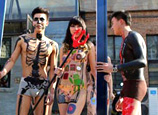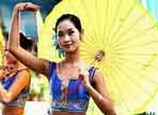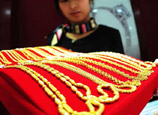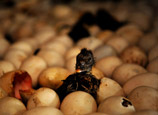
She had been a dancer since she was four, training in jazz, contemporary, cabaret and ballet, and had wanted to be a dancer until the age of 14, when she decided on the circus.
While her natural flexibility was sometimes a hindrance for dance, it was helpful in acrobatics. After Cirque du Soleil, Phillips printed off contortion poses from the Internet, and spent hours "rolling around" at home, trying to do them.
When she finished high school, Phillips studied for a diploma in circo arts at Christchurch Polytechnic Institute of Technology, rather than studying contemporary dance as her mother had hoped. Most of her friends went to university, and couldn't understand Phillips' choice. "They're quite amazed at what I'm doing and that it's actually a career," she says.
After gaining her diploma, she toured with Circus Aotearoa before training at the Beijing Acrobatics School in 2010. She was drawn to China since she had become interested in foot juggling, a famous Chinese skill. She had also heard of the Chinese school from a New Zealand graduate.
But while she made good friends in Beijing, it wasn't as useful for professional development. The school accepted any foreigners, regardless of skill level.
So one day, Phillips hopped on a five-hour train to Wuqiao County to meet the principal of one of China's most famous acrobatic schools.
"I'd come from Beijing, which is just hectic, to this little town, where I was walking down a dirt road. There were paddocks with sheep everywhere," she recalls. She explained to the headmaster what she wanted to do, via her friend who translated over the phone from Beijing. He was impressed by videos of her training back in Beijing, and she managed to score a place.
She has been in Wuqiao since November last year and hopes to stay until December - she still wants to master juggling a table with one foot.
Unfortunately, though, the money is running out to pay monthly NZ$1,000 (US$847) fees covering tuition, board, water and Internet access. She spends all her spare time applying for scholarships. Her parents, who have supported her all along, remind her that if this doesn't work, she can never look back and say she didn't do enough.
To most people, being a circus performer doesn't sound like a lucrative career, however, Phillips says those who combine skills with performance flare can be very successful.
"When you're watching a circus troupe, your like, 'Holy crap, I can't believe there are seven people standing on top of each other and the little one on top is doing a hand stand and they're all on a unicycle. But they all look so angry, and the costumes are bad, the music's bad, the choreography's bad. It's got to be the whole package," she says.
The more skills a performer has, the more versatile and employable he or she is, Phillips says, so it's good to have one major, really good act, with a few different acts on the side.
It's fair to say Phillips is more determined than most people her age, sticking with her goal despite loneliness, injury, financial difficulties and the language barrier.
"I've got so much drive because it's what I want," she says. "I'm a perfectionist, and I'm not happy with my level at the moment. I want to be at a level where I'm surprised at myself."
What she loves most about acrobatics - aside from performing - is the feeling of getting something right.
"I might be practicing a move for hours a day for four or five months before I get it right once," she says. "And when I get it right, oh my god, it feels so good. It's what motivates you to keep training."



















![]()
